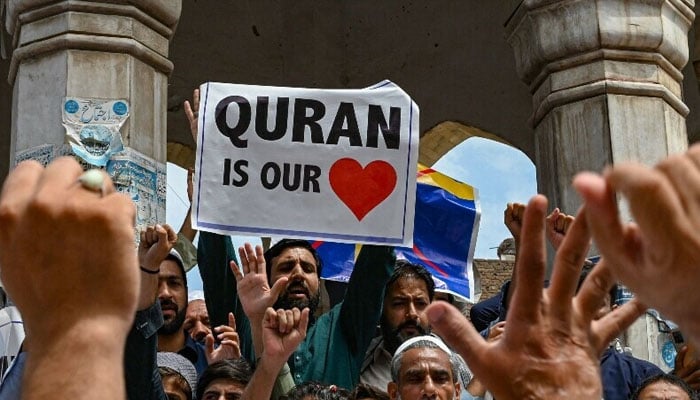Denmark passes law declaring burning, defiling of Holy Quran illegal
Denmark's law prohibits “inappropriate treatment of writings with significant religious importance for a recognised religious community”
Denmark's parliament enacted legislation making it illegal to burn copies of the Quran in public places after demonstrations in Muslim countries over the burning of Islam's sacred book sparked security worries.
The bill, which prohibits “inappropriate treatment of writings with significant religious importance for a recognised religious community”, was passed with 94 votes in favour and 77 opposed in the 179-seat Folketing on Thursday, reported Al Jazeera.
In practice, it will be prohibited to burn, rip, or otherwise desecrate sacred writings in public or movies designed for widespread distribution.
Those who violate the law face a fine as well as up to two years in jail. Queen Margrethe must formally sign it before it takes effect. This is predicted to occur this month.
According to the Ministry of Justice, the goal of the law is to combat "the systematic mockery" that, among other things, has led to the intensification of the threat of terrorism in Denmark.
This year, anti-Islam campaigners burnt or otherwise destroyed copies of the Quran in Denmark and Sweden, causing tensions with Muslims and prompting calls for the governments to prohibit the practice.
Following the appeal of powerful Shia religious and political leader Moqtada al-Sadr, hundreds of protesters attempted to march to the Danish embassy in Baghdad's guarded Green Zone in late July.
The Scandinavian country temporarily strengthened border restrictions in response to the worsening security situation.
According to national police records, 483 book or flag burnings were reported in Denmark between July 21 and October 24.
The measure, which was first introduced at the end of August, was altered in response to concerns that its initial draught hindered free expression and would be impossible to implement. It was initially intended to encompass religiously significant things.
Denmark has attempted to establish a compromise between constitutionally guaranteed freedom of expression, including the ability to critique religion, and national security due to concerns that Quran burnings might spark assaults.
Domestic critics in Sweden and Denmark have warned that any restrictions on critiquing religion, including the burning of Qurans, harm the region's hard-won liberal liberties.
“History will judge us harshly for this and with good reason. … What it all comes down to is whether a restriction on freedom of speech is determined by us or whether it is dictated from the outside,” said Inger Stojberg, leader of the anti-immigration Denmark Democrats party, who opposed the ban.
Denmark's centrist coalition government claims the new laws would have only a little impact on free speech and that criticising religion in other ways is still permissible.
Denmark sparked considerable outrage in the Muslim world in 2006 after a Danish newspaper published 12 caricatures of the Prophet Muhammad (PBUH), one of whom wore a bomb as a turban.
Images of the Prophet Muhammad (PBUH) are considered sacrilegious by Muslims and encourage idolatry. The photographs sparked violent anti-Denmark rallies by Muslims all across the world.
Sweden, like Denmark, is examining methods to legally ban Quran desecrations, but it is taking a different approach.
It is investigating whether police should consider national security when approving applications for public protests.
-
Disney’s $336m 'Snow White' remake ends with $170m box office loss: report
-
Travis Kelce's mom Donna Kelce breaks silence on his retirement plans
-
Hailey Bieber reveals KEY to balancing motherhood with career
-
Hillary Clinton's Munich train video sparks conspiracy theories
-
Woman jailed over false 'crime in space' claim against NASA astronaut
-
Columbia university sacks staff over Epstein partner's ‘backdoor’ admission
-
Ohio daycare worker 'stole $150k in payroll scam', nearly bankrupting nursery
-
Michelle Yeoh gets honest about 'struggle' of Asian representation in Hollywood












